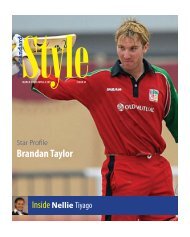StyleISSUE
Create successful ePaper yourself
Turn your PDF publications into a flip-book with our unique Google optimized e-Paper software.
August 3 to 9 2014 THE STANDARD STYLE / INSPIRATION 5<br />
Relational thinking for wholesome Living<br />
Cynthia Hakutangwi<br />
According to psychologist Sidney<br />
Jourard, fully 85 percent of your happiness<br />
in life will come from your personal<br />
relationships. Your interactions<br />
and the time that you spend with the people<br />
you care about will be the major source of<br />
the pleasure, enjoyment and satisfaction that<br />
you derive daily. The other 15 percent of your<br />
happiness will come from your accomplishments.<br />
Unfortunately, many people lose sight<br />
of what is truly important, and they allow the<br />
tail to wag the dog. They sacrifice their relationships,<br />
their major source of happiness, to<br />
accomplish more in their careers. But one’s<br />
career, at best, can be only a minor source and<br />
a temporary one, at that of the happiness and<br />
satisfaction that everyone wants.<br />
We are all bio-psychosocial spiritual beings<br />
as mankind. True health in mankind is<br />
more than the absence of disease since wellness<br />
involves health in all dimensions of life.<br />
Considering that the dimensions of life are all<br />
interrelated it becomes inevitable that decisions<br />
in one dimension can positively or negatively<br />
influence the other areas.<br />
Relational needs and wholesome living<br />
From a societal approach, the top ten relational<br />
needs include Acceptance, Affection,<br />
Appreciation, Approval, Attention, Comfort,<br />
Encouragement, Respect, Security and Support.<br />
Wholesome living is a product of pursuing<br />
wholeness in every area of our lives. This<br />
includes giving thought to how our actions<br />
and words may affect the vitality of those<br />
we interact and relate with. Wholeness is an<br />
expression of completeness, entirety, totality,<br />
unity, fullness and comprehensiveness.<br />
What lens are you putting on?<br />
I remember vividly the frenzy that hit our<br />
neighbourhood in the early 80’s when the British<br />
pop music outfit Five Star released their<br />
hit single “All Fall Down” in 1985. It became so<br />
trendy for the teen fans that could afford it to<br />
walk around the neighbourhood with an air of<br />
“coolness” donning a pair of denims and dark<br />
sunglasses (“shades” as they were popularly<br />
known). It was with a glee of delight when I<br />
briefly wore my first pair of “shades” which<br />
I had “borrowed” from my brother one Saturday<br />
afternoon. What an extraordinary perspective<br />
I had of everything that sunny afternoon!<br />
Everything and everyone appeared so<br />
dark and different for those few moments yet<br />
as soon as I removed them from my tiny face,<br />
When things go wrong!<br />
my familiar light-filled world was restored.<br />
In life we may not always be able to control<br />
the variables but we are responsible for the<br />
perspectives we choose to adopt as we interact<br />
with the world and everything around us. On<br />
various levels the world experiences so many<br />
struggles that arise from a self-lens. The selflens<br />
causes individualistic thinking which<br />
is responsible for a limited scope of problem<br />
solving, lack of consideration of the broader<br />
society, incomprehensive solutions and the<br />
dissolution of families, institutions and societies.<br />
Relational thinking is an approach for<br />
transforming societies, organisations and<br />
economic productivity. “It is a paradigm shift,<br />
where we view everything through a relational<br />
lens, speak with relational language, to give<br />
new relational definitions, and use relational<br />
instruments to reach relational goals which<br />
benefit everyone” - Relationships Global (UK).<br />
In the words of the author John Powell, “to<br />
live fully, we must learn to use things and love<br />
people, and not love things and use people.” It<br />
is our perspective therefore which makes the<br />
difference between what we see and what can<br />
be achieved. Putting on the relational lens<br />
means that we learn to see life from the perspective<br />
of relationships, as opposed to seeing<br />
it from the viewpoint of materialism or individualism.<br />
Relational Thinking is Sustainable Thinking<br />
Learning to think relationally is the first step<br />
towards building a more relational world.<br />
Whilst relationships are important in the<br />
lives of individuals they are also key in organisations<br />
on a Strategic, Cultural, Operational<br />
and Personal level. The scope of the<br />
relational lens is not only personal but organisational<br />
and extends to the wider society. For<br />
those in business Relational Proximity is a<br />
real issue to customers. When customers are<br />
not experiencing what ought to be the results<br />
of relational proximity – namely, a feeling of<br />
connectedness, being understood, belonging<br />
and fairness that supports respect, they start<br />
to disengage. The same applies in personal<br />
relationships. With relational proximity we<br />
can build trust, accountability, supportive relationships<br />
and a sense of belonging.<br />
The cumulative effect of adopting Relational<br />
Thinking results in the attainment of<br />
stronger families, more effective organisations,<br />
increased social cohesion in communities,<br />
improved economic productivity and<br />
greater personal and national wellbeing.<br />
Seek to establish healthy relationships<br />
The tragedy of our time has been the tendency<br />
to look at relationships with a “whatdo-I-get-out-of-this?”<br />
perspective. Meaningful<br />
and healthy relationships are developed and<br />
established when all the parties are willing to<br />
give and receive. The benefits of cultivating<br />
good relationships are endless. We can make a<br />
choice today and determine to think relationally<br />
and give of ourselves what we expect to<br />
benefit out of any meaningful relationship by<br />
changing our perspective.<br />
Cynthia is a Communications and Personal<br />
Development Consultant, a Life Coach,<br />
Author, and Strategist. She is the Managing<br />
Consultant of Wholeness Incorporated. “A<br />
passionate and fervent motivational speaker<br />
who speaks at seminars, workshops and conferences<br />
provoking people and institutions to<br />
challenge their comfort zones by imparting<br />
vital knowledge and information which can<br />
help them to live balanced lives and create<br />
trans-generational solutions.” E-mail: cynthia@wholenessincorporated.com<br />
Rufaro Mushonga<br />
“Show me a person who never made<br />
a mistake, and I will show you a person<br />
who never did anything.” This<br />
is a quote from William Rosenberg,<br />
the founder of Dunkin’ Donuts, a<br />
successful American global doughnut<br />
and coffee chain.<br />
Are you a perfectionist? It is<br />
important to strive for excellence<br />
in everything that you do, but being<br />
a perfectionist can send you<br />
to an early grave, because perfectionists<br />
struggle to deal with and<br />
bounce back from mistakes they<br />
have made. They live in denial. I<br />
was once a perfectionist, but in my<br />
line of work, I have learnt the hard<br />
way that I will make mistakes, and<br />
some of those mistakes can result<br />
in losing a client, or even losing<br />
your credibility in business. The<br />
bottom line is no one is perfect. We<br />
all make mistakes.<br />
I had a traumatic event experience<br />
a few weeks ago. I planned an<br />
event to near perfection, but I had<br />
service providers to deal with. This<br />
event was out of Harare, and I had<br />
to work within a budget, which<br />
meant using event service provid-<br />
ers that I had not worked with before.<br />
I consulted with people that I<br />
trust who are in the same line of<br />
business as I am, and they referred<br />
me to “reputable” service providers.<br />
Now, you can control your own<br />
actions and behaviour, but you cannot<br />
control the actions and behaviour<br />
of another person, no matter<br />
how hard you may try to. The mistake<br />
that I made was to assume that<br />
basic event etiquette was not something<br />
that I had to educate these<br />
service providers on. I thought<br />
they knew! But they needed intense<br />
micro-managing, and this is something<br />
that I realised when it was<br />
already too late.<br />
“Murphy’s Law” took over. For<br />
those of you who are not familiar<br />
with this law, it says that “anything<br />
that can go wrong will go wrong. “<br />
It was a circus! I was disturbed by<br />
the lack of professionalism that I<br />
had to deal with. In fact, I was traumatised!<br />
As my business partner,<br />
Archie Mhone, always says “You<br />
can plan - and plan to perfection,<br />
but when it comes to this business,<br />
you are only as good as the performance<br />
of your service providers. “<br />
And as I said earlier, it was a circus.<br />
So you’ve made a mistake that resulted<br />
in losing a client that was<br />
key to your bottom line. Or you’ve<br />
encountered a huge obstacle that<br />
has brought your efforts to a halt.<br />
That experience, for a small business<br />
owner can be discouraging<br />
to a point where you want to give<br />
up, or you lose confidence in your<br />
abilities, and sometimes become<br />
fearful that you will make another<br />
mistake. In order to be successful,<br />
more often than not, you have to<br />
experience setbacks. Rather than<br />
crawl into a hole somewhere and<br />
hibernate, confront these setbacks<br />
head on.<br />
Accept your failure or mistake.<br />
Accept that you are far from perfect<br />
– no one is perfect. Accept that you<br />
are going to make more mistakes<br />
as you grow. This doesn’t mean<br />
you should become mediocre – by<br />
all means strive for perfection! But<br />
once you accept that you will make<br />
mistakes, when you do make a mistake,<br />
you will be able to dust yourself<br />
off, take corrective measures,<br />
and move forward. You will be a<br />
better entrepreneur than you were<br />
when you started.<br />
Learn from your mistakes. Use<br />
your failure as an opportunity to<br />
learn, to grow and to improve your<br />
business. Use it as motivation to<br />
succeed. In my line of business,<br />
which is events management, I<br />
work with checklists on a daily<br />
basis. So when I make a mistake,<br />
or overlook something, I add these<br />
mistakes to my checklists, so that<br />
next time, I know I won’t repeat the<br />
same mistake. To take my experiences<br />
even further, over the years I<br />
have found myself with a series of<br />
detailed checklists that I give to my<br />
team whenever we have a job to do.<br />
Sometimes I give these to clients. So<br />
because of my passion for wedding<br />
planning, I recently decided to put<br />
these checklists together and write<br />
a wedding workbook for couples to<br />
use, to help them plan their wedding<br />
without leaving out the small<br />
but essential planning steps that<br />
can make or break their special day.<br />
If I had not made mistakes, I would<br />
not have been inspired to write a<br />
book.<br />
Do not make excuses – take<br />
ownership of your failures. I am<br />
sure many of you can relate to this.<br />
Someone offers you a product or service<br />
at a certain price, and you negotiate<br />
the price downwards, and the<br />
product malfunctions, or the service<br />
is poor. The person who sold it<br />
to you blames it on the fact that you<br />
did not pay enough. Is this a legitimate<br />
reason for failing to deliver?<br />
Or is it just an excuse? Take ownership<br />
of your mistakes, and show<br />
that you have learnt from them.<br />
Admitting to a client that you were<br />
in the wrong is better than making<br />
an excuse, or shifting the blame. A<br />
client will respect you more if you<br />
show integrity.<br />
Get over it fast and bounce back.<br />
Get back on the horse! Time is money,<br />
and there is no time for you to<br />
throw yourself a pity party every<br />
time you fail. The longer you spend<br />
wallowing in your failure, the harder<br />
it will be to get back on the horse.<br />
Don’t give up!<br />
Rufaro Mushonga<br />
rufmush@gmail.com


















